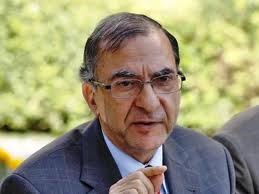Peace still possible in the region of subcontinent: Dr. Fai
Washington, D.C. February 6, 20114. “The United Nations Security Council resolutions on Kashmir were not resolutions in the routine sense of the term. Their provisions were negotiated in detail by the United Nations Commission with India and Pakistan and it was only after the consent of both Governments was explicitly obtained that they were endorsed by the Security Council. They thus constitute a binding and solemn international agreement about the settlement of the Kashmir dispute,” said Dr. Ghulam Nabi Fai in a paper read during a seminar organized by Mohtaram Shabir Ahmed Shah Sahib in Srinagar entitled: Kashmir Dispute and the Role of the United Nations.
Dr. Fai emphasized, “Much is being made of the fact that six decades have passed since the principled solution was formulated by the United Nations with almost universal support. Mere passage of time or the flight from realities cannot alter the fact that these resolutions remain unimplemented until today. The United Nations resolutions can never become obsolete, or over taken by events or changed circumstances. The passage of time cannot invalidate an enduring and irreplaceable principle – the right of self-determination of the people of Kashmir. If passage of time were allowed to extinguish solemn international agreements, then the United Nations Charter should suffer the same fate as the resolutions on Kashmir. If non-implementation were to render an agreement defunct, then the Geneva Convention in twenty-first century in many countries is in no better state than these resolutions.”
He reminded “It is not the inherent difficulties of a solution, but the lack of the will to implement a solution, that has caused the prolonged deadlock over the Kashmir dispute. The deadlock has meant indescribable agony for the people of Kashmir and incalculable loss for both India and Pakistan. If the new world order is not to be an order of unreason, injustice and terror and thus a permitted anarchy, that agony should be brought to an end and that loss repaired. The peace that has eluded the South Asian subcontinent should be made secure.”
Fai warned that “There is no way Kashmir dispute can be settled once and for all except in harmony with the people’s will, and there is no way the people’s will can be ascertained except through an impartial vote. Secondly, there are no insuperable obstacles to the setting up of a plebiscite administration in Kashmir under the aegis of the United Nations. The world organization has proved its ability, even in the most forbidding circumstances, to institute an electoral process under its supervision and control and with the help of a neutral peace‑keeping force. The striking example of this is Namibia and East Timor, which were peacefully brought to independence after decades of occupation and control by South Africa and Indonesia respectively. Thirdly, as Sir Owen Dixon, the United Nations Representative, envisaged six decades ago, the plebiscite can be so regionalized that none of the different zones of the state will be forced to accept an outcome contrary to its wishes. “
Fai hope that “If sincerity is brought to the process in place of cheap trickery, the dawn of peace will glow as never before over the subcontinent – the home to one-fifth of total human race.”

 This flood was the first in history, in the living memory of Kashmir. More than 450 people are dead, and more than $1bn in destruction has been estimated. The actual magnitude of the total destruction, the number of dead and the people who are missing may not be known for some time. Kashmir Valley was cut off from the rest of the world for days. Thousands of villages have been submerged, including the capitol city of Srinagar. Hundreds of thousands of people particularly in the rural areas still remain trapped without any outside help or rescue and relief. There has been a total breakdown in communication with no telephone contact of the people with their loved ones Boats were not available. People had to stand on their rooftops waiting for someone to rescue them.
This flood was the first in history, in the living memory of Kashmir. More than 450 people are dead, and more than $1bn in destruction has been estimated. The actual magnitude of the total destruction, the number of dead and the people who are missing may not be known for some time. Kashmir Valley was cut off from the rest of the world for days. Thousands of villages have been submerged, including the capitol city of Srinagar. Hundreds of thousands of people particularly in the rural areas still remain trapped without any outside help or rescue and relief. There has been a total breakdown in communication with no telephone contact of the people with their loved ones Boats were not available. People had to stand on their rooftops waiting for someone to rescue them.